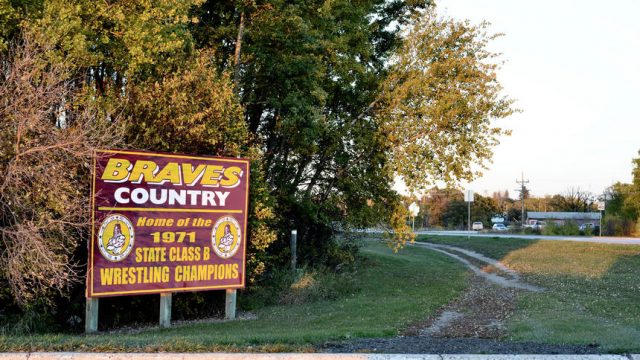Should Convicted Criminals Be Able to Serve on North Dakota’s School Boards?

A sign outside the Turtle Mountain Community High School on Thursday, Oct 12, 2014, on the Turtle Mountain Indian Reservation in Belcourt, N.D. The high school's enrollment is 480 students from around the area. (Logan Werlinger/Grand Forks Herald)
Last week Bismarck Tribune reporter Amy Dalrymple ran a story about a Twin Buttes woman named Melissa Starr who was elected to the local school board despite a conviction for embezzlement she’s still paying restitution on.
Embezzlement from the school district she was just elected to govern.
“Starr was one of seven Twin Buttes School Board members and district employees who were indicted in 2006 in U.S. District Court on charges related to conspiring to defraud the school of more than $665,000,” Dalrymple reported. “The fraud involved a series of false travel vouchers, payroll advances and bonuses. Starr pleaded guilty to embezzling more than any of the other defendants. She was ordered to serve 1½ years in federal prison, serve three years of supervised release and pay more than $309,000 in restitution.”
Starr, who still owes roughly $288,000 in restitution, received only 35 votes in the election. There were only 54 people who voted (three other candidates split the remaining 19 votes).
Doug Delorme, a sitting member of the Belcourt School Board, “pleaded guilty in 2003 to charge of embezzlement from the tribe, witness tampering and subornation of perjury” while serving as a member of the tribal council on the Turtle Mountain Reservation, and was ordered to pay $7,800 in restitution in addition to being sentenced to a year in prison.
In 2007 Delorme was convicted of assaulting the tribe’s personnel director, breaking his nose and cheekbone.
UPDATE: Crystal Delorme, wife of Doug Delorme, contacted me after publication and disputed the Associated Press report linked above which characterized the injuries to the victim as a broken nose and cheekbone. She alleges that the victim only received “a scratch” on his face.
Jermey Laducer, another member of the Belcourt School Board, was arrested in Mandan this weekend for terrorizing (see booking photo on the right). Laducer also has a simple assault charge pending in Rolette County.
These examples are from tribal communities, and when I reached out to Indian Affairs Commissioner Scott Davis about them he said he’s noticed the same issues I have.
“I’m concerned,” he told me this morning. “I’ve been concerned. The last seven months I’ve been watching things, and I’ve gotten a lot of calls and anonymous emails from people who are concerned about the behavior of these school board members.”
Davis said the issues with members of the Belcourt School Board, in particular, caught his attention since his family is from that community and he’s a graduate of Belcourt High School.
“I’ve talked to some legislators about looking at a law,” Davis tells me. What he’d like to see is background checks for those seeking to run for school boards, and a prohibition on candidates convicted of crimes related to embezzlement, drugs, or violence.
But he’d like to see law focused specifically on school boards only.
“The difference between serving on these boards and any other boards is look at who you’re governing,” he told me. “It’s children. It’s a vulnerable population. If you or I were going to work for a school tomorrow what’s the first thing they’re going to do for us? They’re going to background check us.”
“I’m not a teacher or coach or administrator, but I think if I was and my school board members were felons in the areas of violence or embezzlement or drugs, I think I’d have a hard time working at that school,” Davis added. “I’m all about second chances, but I think in cases of felonies – embezzlement and violence and drugs – there’s really no wiggle room.”
Lawmakers are in Bismarck this week for their organizational session – Governor Doug Burgum will deliver his budget recommendations to the House and Senate on Wednesday – and Davis says he plans to have conversations with them about his proposal.
I’m sympathetic to Davis’ concerns. I share them, in fact. But we’re also talking about elected positions. In a couple of these situations we’re talking about people whose convictions were well known, even publicized in various media outlets, and yet voters elected them anyway.
How far can we go toward protecting voters from themselves?





